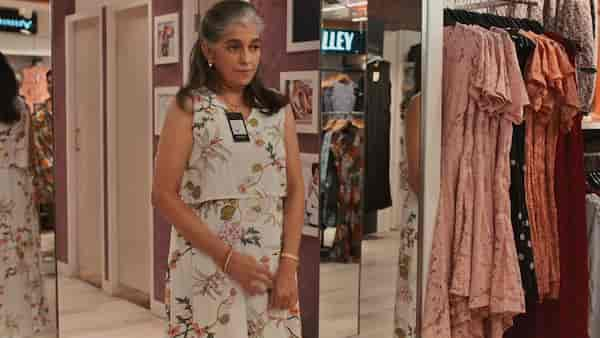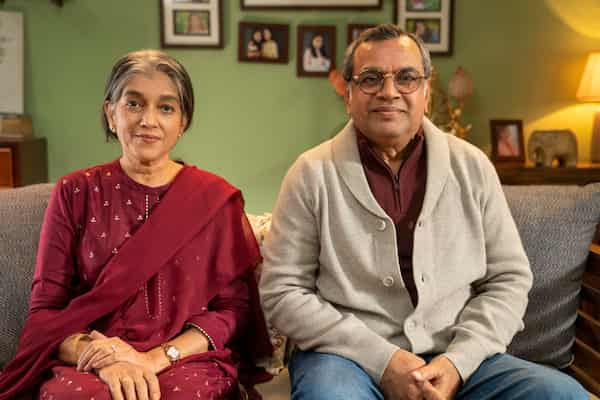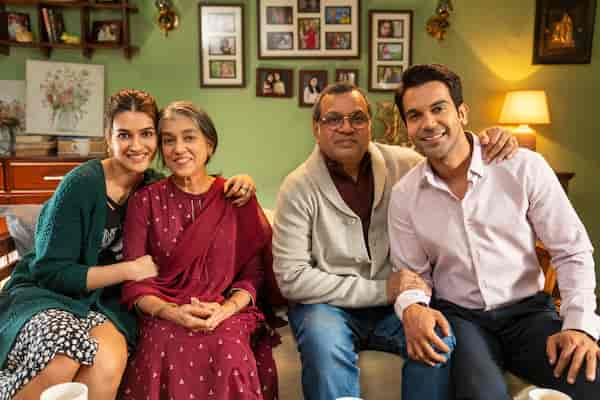Exclusive! Ratna Pathak Shah: Comedy saved me from becoming a boring actress
Ratna Pathak Shah also spoke about working with the “extremely well prepared, very interested and intelligent” Rajkummar Rao and Kriti Sanon in Hum Do Hamare Do.

Last Updated: 01.58 PM, Oct 28, 2021
Ratna Pathak Shah in her four-decade-long career as an actor has played roles that are unforgettable and deservedly so. Once again, the veteran actor is coming back with a memorable character in Hum Do Hamare Do, in which she has reunited with Paresh Rawal.
The actors will be seen playing the role of ex-partners who reunite to get adopted by Rajkummar Rao as his parents. The film marks Abhishek Jain’s directorial debut, and also features Kriti Sanon as the female lead.
Ahead of Hum Do Hamare Do's release on Disney+ Hotstar, Ratna Pathak Shah exclusively spoke with OTTPlay, about the novel concept of adopting parents, working with Paresh, Rajkummar and Kriti.
In the conversation, the Sarabhai vs Sarabhai actor also gave her a strong take on the OTT censorship debate. The actor also revealed if comedy comes easy to her and also her favourite role she played so far.
Edited excerpts below:
What was your reaction to this novel idea of adopting parents which forms the premise of Hum Do Hamare Do?
It's an interesting and very modern situation, I guess. That suddenly, there is a distance between parents and children that seemed never existed before. About 20-25 years ago, this would have been seen as an outrageous concept. But today, nuclear families are becoming the rule, rather than the exception, at least in the urban context. Suddenly this kind of story has acquired poignancy, which I'm hoping that the film will be able to explore.
The film was offered to you after Dimple Kapadia couldn't be a part of it. Were you aware of it?
I can't remember if I heard about it before or after I said yes to the film. I'm not sure.
You are working with Paresh Rawal in a movie after a long time. Interestingly in Yun Hota Toh Kya Hota also, you both played ex-partners, who cross paths after a very long time. How has been the work experience?
Paresh is an actor that I have always admired and looked out for. Even in the silliest and smallest of roles that Paresh does, he brings to it such energy and enthusiasm. I respect him greatly for that. When he is good, he is very, very good. So I was very keen on working with him. Certainly, this experience has lived up to my expectations and we had a good time doing it. I've watched how he worked. When I read the script, I wasn't sure how he's going to play the character. Sometimes the part is written in such a silly manner, I've wondered what he is going to do with a scene like this? In each case, I was taken aback and delighted with how he approached the scene.

You have worked with a lot of new generation actors. In this film too, you have shared screen space with Rajkummar Rao and Kriti Sanon. Is there any give and take which happens on sets while filming scenes with them?
I find them extremely well prepared, also very interested and intelligent too. I find a lot of these young actors are not so involved with projecting themselves as important people, which was what stars of my generation did. It was tedious to be on a set with a star, I have to say because the thing was about that person. The film itself didn't mean anything. So that kind of dance of ego on the set that used to take place has fortunately been missing in the last few films that I've done. I can't tell you how relieved I am about that. So with both Rajkumar and Kriti, I was extremely impressed with how they approached the scenes. They were willing to rehearse, they were curious about how it could be done differently, there was much-given take, there was much hanging around. Abhishek was fortunately open to the idea of all of us contributing and creating the scene, which may have been somewhat different from how he had written it.
So all in all, it was extremely happy and very, what's the word I'm looking for? A very sane way and sensible way of working on a project, because what is written in the idea of one person, or maybe two or three, whoever the scriptwriters are. But how does the scene come off the page? That's what finally matters, doesn't it? So there is a contribution of so many other people, the actors, also the DOP, how the scene is lit, how it is framed. How the director wants to give importance to what part of the scene all these things come together and produce the magic that you see on screen. So that process of translation, if it is done democratically and cohesively, it's a great pleasure. That's what we managed to achieve in this film.

You have been doing the comedy genre since the 80s, has the genre always come easy to you?
Not at all. I never expected to be doing any comedy. The first paying part I got was Idhar Udhar which was a comedy. I didn't know anything about it, nothing at all. I don't even think I'm a very funny person, at least certainly, at that time, I didn't think of myself as a possibly funny actor. I only thought of myself as a dramatic actor. So I had to learn on the job and I found it very difficult, very scary. I had to work bloody hard at it, to figure out how to go about it. So I have always said that comedy saved me from becoming a boring actress, I still hold on to that. I think it's one of the most difficult things to write, it's even more difficult to perform. But you can't do good comedy without good writing. It's as simple as that.
You have played the role of a mother which are poles apart from each character. Which has been your favourite so far?
I find it hard to answer this, which is your favourite type of question. Why can't I have more than one favourite? I genuinely have enjoyed most of the mothers I did. I think the so-called mother in Golmaal 3 was as interesting to play as the mother in Thappad and Jaane Tu... Ya Jaane Na. Some of those parts are written better. They're written more cleverly with better lines, dialogue, humour, some of them are written a little more crudely. So the crude ones one doesn't enjoy it so much. But the other ones I think I have been lucky enough to say that I've enjoyed all the various mothers I got to play. But if I am asked at gunpoint to choose one. What would I say? Maybe Maya Sarabhai, yes she would be a mother I would have liked to have.
You were a part of OTT when it didn't even become a boom with Sarabhai vs Sarabhai Take 2, Love Per Square Foot. What do you have to say about the content being created on the OTT platform now?
Many people forget Selection Day, I had a very interesting part in that series. Thank heavens for it. In short, that's what I have to say. It has given opportunities to many actors, writers, directors, and many other types of people who contribute to making a film or series an interesting thing to watch. So it has also helped the audience to grow up a little bit in the process. I'm very keen to see what happens now because when we started television, we were in somewhat the same space. It is such an exciting platform, it was so different, and look where we are now. So let's not write Hallelujah, as yet, to the OTT platform. We don't know where they will go, we don't know how they will be regulated. We don't know what kind of censorship will be exercised, whether external or even worse, from inside, self-censorship, the most disgusting kind of censorship ever. So there are many ifs and buts in this business at the moment. But having said all that, I feel that there is some sense of hope, at least at this moment.
So, what's your take on the ongoing debate about censorship being drawn on OTT?
It's a very important part of the human beings existence, entertainment. The kind of entertainment that is offered to citizens in a democracy is very different from the kind of entertainment that is offered to citizens in an autocracy. Iran also offers its citizens' entertainment but you and I don't know what that is. We know how difficult Iranian filmmakers find it to make their kinds of films and yet they make them. So, yes, censorship is a killer, self-censorship is worse because it makes people into cheats. I'm afraid at the moment, it looks like we may go in that direction. But I'm not yet willing to give up hope. I think there is an audience of young people out there who have now seen the value of having a choice. I hope they are willing to exercise their choice in the future.
How do you choose a script after years of experience? What is it that you thrive for when it comes to your character?
If the characters that are being offered is different from things that I've done before, if it seems to be believable, real, and if it seems to give me a way to connect to it, then of course. So really, it's the script, and the next will be the director because I have seen good scripts messed up by directors who didn't know their job properly. So the next important factor for me is the director. Finally, of course, the people I'm going to work with because really, this is not a one-person show. Acting should not be ideal and it's certainly not a competition. So if you're going to get into a space where you're battling with your co-actors for importance, then it's going to be shown for egos, not for artists. So I avoid those kinds of projects.
A lot of people credit OTT as a medium that increased the shelf life of an actor, what do you have to say about it?
I am not a slice of cheese that has a shelf life. I'm not an apple, that is not rotting after a few days. I am somebody who hopes to act until my last day. I feel that my services would be required because people will need older people also to tell stories. Maybe not as much as they need younger people, but they will. I will see to it that I'm good enough to be cast over and over again.
Your upcoming film is Jayeshbhai Jordaar with Ranveer Singh. What would you like to say about your character in the film?
I would love to see it myself because I have no idea what that is turned out to be. It's quite different from everything else. It's an interesting script again, an interesting group of actors and a first time director. So all my points for reference have been ticked off and I'm looking forward to seeing the film myself. I have a feeling that it will turn out to be an interesting project.

 Premium
Premium